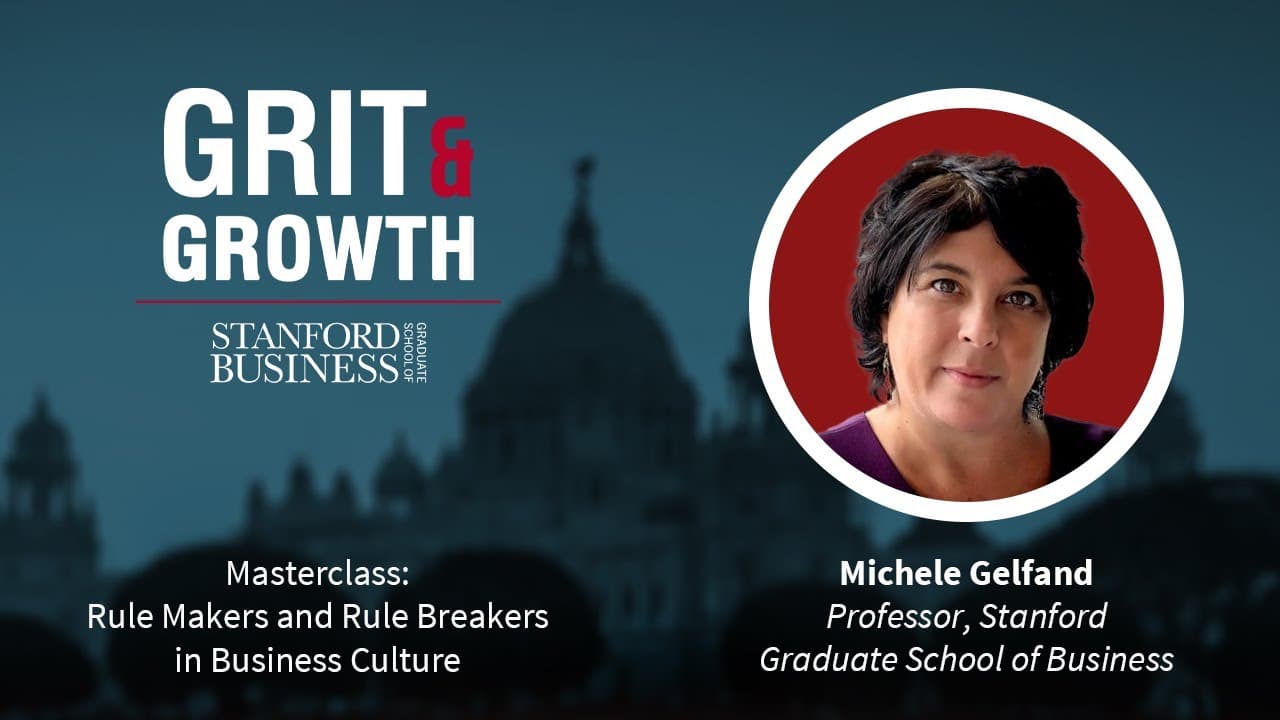S4E6 Grit & Growth | Masterclass: Rule Makers and Rule Breakers in Business Culture
10 Sep 2024 (over 1 year ago)

Cultural Tightness and Looseness
- Culture is defined as the norms and values that help to organize social action. (5m17s)
- Tight cultures have strict rules and punishments for deviations, while loose cultures have weaker rules and a wider range of permissible behavior. (2m56s)
Cultural Differences in Business
- Understanding cultural differences is important for businesses, as cultural incompatibility can impact financial performance, such as in mergers and acquisitions. (4m14s)
- Organizations that are too restrictive can benefit from introducing flexibility, while those that are too loose can benefit from adding structure. This balance is called "flexible tightness" and is important for creating high-performing teams. (5m50s)
Tight vs. Loose Cultures: Strengths and Weaknesses
- Loose cultures are more creative but may struggle with scaling up, while tighter cultures are better at implementation and scaling but may lack in novel ideas. (6m48s)
- Successful leaders in organizations need to analyze their organizations in terms of people, practices, and leadership as they relate to tight and loose culture. (7m21s)
Finding the Right Balance
- Organizations that are too extreme, either too loose or too tight, can face problems. The key is to find a balance between accountability and empowerment, which may need adjusting depending on the context. (11m15s)
- Tight systems, like hospitals and the military, prioritize accountability, while loose systems, like startups, may overemphasize empowerment. Shifting a culture towards tightness often encounters resistance due to perceived threats to autonomy, while adding looseness to tight systems can raise concerns about losing control. (11m32s)
Case Study: Bob Herbold and Microsoft
- Bob Herbold, during the early days of Microsoft, addressed the lack of standardization in financial accounting by tightening up the system. Despite facing resistance, he emphasized the team's voice and the financial benefits, successfully implementing the changes. (13m54s)
Scaling Up and Cultural Differences
- Business leaders who experience success with a small business often struggle to scale up because they haven't established systems that allow them to delegate tasks to others. (16m21s)
- Tight cultures, often found in environments with high threat and corruption, rely on honor as a currency, making it challenging to build trust and delegate responsibility. (17m29s)
Entrepreneurship and Cultural Context
- While loose cultures tend to view entrepreneurship favorably, tight cultures may see it as risky and stigmatized, particularly in contexts where failure carries severe social and economic consequences. (19m0s)
- The United States, particularly Silicon Valley, has a generative and radical model of entrepreneurship and innovation, while other contexts, such as Singapore and the UAE, have more incremental models. (21m3s)
Cultural Disparity and Entrepreneurship
- The American model of entrepreneurship often involves breaking rules and being defiant, but this approach may not be suitable for individuals from working-class backgrounds who lack a safety net and operate in tight cultures with more danger and less autonomy. (22m12s)
- Michelle argues that business leaders, especially in emerging markets, should be mindful of the disparity between their own privileged backgrounds and the tighter cultures of their employees, who may face greater risks and consequences for failure. (23m56s)
Cultural Influences on Trust and Business
- Steve Jobs limited product offerings at Apple to three things he believed were the most important. (25m46s)
- Michelle Gelfand is researching the cultural basis of trust through a global study that includes surveys, experiments, and interviews. (26m39s)
- Gelfand's research team is currently gathering data in eight African nations, including Nigeria, to expand their understanding of cultural influences on business. (26m52s)